What Does Inelasticity Mean?

- A good or service will likely be inelastic if there are no alternatives to the good or service in question.
- Goods that are generally considered inelastic include food, water, petrol, and cigarettes.
- A firm with a monopoly on certain goods or services can also cause inelasticity, because there is only one provider and they can charge what they want.
Have you ever heard of elasticity and inelasticity? They’re two economic terms used to describe how sensitive a good or service is to price fluctuations. If the demand for a product or service is sensitive to price fluctuations, it is considered elastic. If the opposite is true, and a product or service is not very sensitive to price fluctuations, it is considered inelastic.
Think of something you can’t live without, like food. Everybody has to eat, right? If the price of food goes up, do you stop eating? Of course not. You will either pay the higher cost of food or go hungry. This is an example of inelasticity. It basically means that no matter what the price is for something, people will usually pay it, because it’s for something they need. The same is true, not only for food but for other goods and services as well. One major good that can be described as inelastic is oil.
Paying for Oil

Oil is a major driver of the world economy. Without it, the global economy would all but grind to a halt, which is why, even when the price for oil is sky-high, both individuals and businesses will pay it. Do you own a car? Well then, if you want that car to keep taking you places, you’ll need fuel; fuel that’s made from oil. So when oil is expensive, the gas or diesel that you use to keep your car running will be more expensive. But unless you want to ditch your car and walk, or take public transit, you’ll have to pay whatever the price for fuel is, whether you like it or not.
If the global economy could keep humming along without oil, and people didn’t need oil for their cars, then oil would be considered elastic, the opposite of inelastic. In this situation, if the price of something is high, people will stop paying for it and seek alternatives. For example, say you’re a person who loves to eat meat, but the price of it is getting too expensive for you. So does that mean you stop eating? No, but it will likely mean that you buy less meat and look for cheaper alternatives, like chicken, fruits, or vegetables. Hence, the price of meat is elastic because it is sensitive to price fluctuations. If the price goes lower, people consume more of it. If it goes higher, they’ll consume less.
No Cheaper Alternatives
The scenario is different for oil, however, because there just aren’t many cheaper alternatives. For example, people with cars who don’t want to pay top dollar for gas or diesel when the price of oil is high don’t have much of a choice other than to stop driving. This is beginning to change, however, as electric car technology improves and may eventually reach the point where an electric car is more economical than the old-fashioned internal combustion engine. There are also more people opting to use alternative means of transportation, such as public transit, bicycles, or walking. Hence, it is possible that in the future, the price of oil will become more elastic, or in other words, more sensitive to price fluctuations once more economical alternatives become available.











